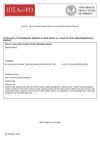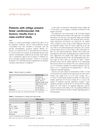 September 2023 in “Journal of Cosmetic Dermatology”
September 2023 in “Journal of Cosmetic Dermatology” Lower vitamin D levels are linked to higher CRP levels in people with a type of hair loss called alopecia areata.
 5 citations,
May 2023 in “Frontiers in immunology”
5 citations,
May 2023 in “Frontiers in immunology” Environmental factors like diet and vitamin levels, especially Vitamin D, can affect autoimmune diseases differently, with lifestyle changes potentially improving outcomes.
 2 citations,
January 2019 in “Springer eBooks”
2 citations,
January 2019 in “Springer eBooks” Segmental Vitiligo is a stable, early-onset form of vitiligo that responds well to early treatment and is ideal for repigmentation studies.
[object Object]  1 citations,
November 2022 in “World Family Medicine Journal /Middle East Journal of Family Medicine”
1 citations,
November 2022 in “World Family Medicine Journal /Middle East Journal of Family Medicine” People in Jeddah know about Vitamin D and its sources but are unclear on how much they need daily, and while many women take supplements, attitudes towards increasing Vitamin D levels vary.
 May 2023 in “Journal of Clinical Medicine”
May 2023 in “Journal of Clinical Medicine” New understanding and treatments for hair loss are improving, but more research is needed.
 29 citations,
December 2017 in “International Journal of Dermatology”
29 citations,
December 2017 in “International Journal of Dermatology” People with alopecia areata often have lower vitamin D levels, which are linked to more severe and longer-lasting hair loss, but vitamin D receptor levels in the skin don't show the same pattern and don't predict treatment success.
 November 2023 in “Research Square (Research Square)”
November 2023 in “Research Square (Research Square)” Combining calcipotriol and PRP is most effective for treating Alopecia Areata.
 13 citations,
December 2012 in “Frontiers in bioscience”
13 citations,
December 2012 in “Frontiers in bioscience” Vitamin D and estrogen may help protect heart and kidney health, and maintaining sufficient vitamin D levels could be especially beneficial for African Americans, postmenopausal women, and people with chronic kidney disease.
 November 2023 in “International journal of biology, pharmacy and allied sciences”
November 2023 in “International journal of biology, pharmacy and allied sciences” Herbal treatments can help with hair problems, but more research is needed.
 532 citations,
August 2011 in “Journal of the American Academy of Dermatology”
532 citations,
August 2011 in “Journal of the American Academy of Dermatology” Vitiligo is a skin condition causing white spots, more common in women, often starts before age 20, and can affect mental health.
 20 citations,
October 2008 in “Archives of dermatological research”
20 citations,
October 2008 in “Archives of dermatological research” Angiogenin helps hair grow by stimulating cell growth and blood vessel formation.
 4 citations,
April 2020 in “Journal of Cosmetic Dermatology”
4 citations,
April 2020 in “Journal of Cosmetic Dermatology” Low vitamin D levels are linked to different types of hair loss.
 11 citations,
January 2011 in “Turkish Journal of Medical Sciences”
11 citations,
January 2011 in “Turkish Journal of Medical Sciences” Low iron levels are a significant risk factor for hair loss, while high vitamin D levels might be a response to hair loss, not a cause.
 July 2023 in “Journal of medical and health studies”
July 2023 in “Journal of medical and health studies” A 3-year-old with vitamin D-resistant rickets and severe hair loss died despite treatment, highlighting the need for improved management of the condition.
 258 citations,
July 2016 in “Reproductive Biology and Endocrinology”
258 citations,
July 2016 in “Reproductive Biology and Endocrinology” The document concludes that insulin resistance is key in PCOS development and early treatment is crucial to prevent complications.
 July 2024 in “Skin Appendage Disorders”
July 2024 in “Skin Appendage Disorders” The supplement significantly improves hair density and appearance in people with hair loss.
 December 2022 in “Türk biyokimya dergisi”
December 2022 in “Türk biyokimya dergisi” The conclusions are: fecal short-chain fatty acids may help prevent cancer, fiber intake can reduce obesity, weight loss is hard for obese people, low BMI cancer patients are more prone to chemotherapy side effects, intermittent fasting benefits gut health, cherry laurel has health benefits in rats, certain gene variations can increase stress in hair loss patients, fecal acids can affect blood sugar levels, cold agglutinin can affect blood test results in autoimmune patients, and people with Crohn's disease have higher levels of a certain chemical in their blood.
 December 2024 in “International Journal of Advanced Research in Science Communication and Technology”
December 2024 in “International Journal of Advanced Research in Science Communication and Technology” The herbal hair tonic is safe, effective for hair growth, and treats scalp issues.
 1 citations,
January 2023 in “Revista Da Associacao Medica Brasileira”
1 citations,
January 2023 in “Revista Da Associacao Medica Brasileira” People with seborrheic dermatitis often have lower vitamin D levels.
The levels of zinc, vitamin D, ferritin, and selenium are different in people with androgenic alopecia compared to a control group.
 July 2023 in “Dermatology practical & conceptual”
July 2023 in “Dermatology practical & conceptual” Low hemoglobin levels are significantly correlated with hair loss in women with Telogen Effluvium.
May 2021 in “Indian journal of forensic medicine and toxicology” Females with androgenic alopecia have significantly lower vitamin D3 and ferritin levels.
3 citations,
June 2011 in “Journal of acupuncture and tuina science/Journal of Acupuncture and Tuina Science” Acupuncture is more effective than medication for treating alopecia areata.
 January 2020 in “Veterinary world/Veterinary World”
January 2020 in “Veterinary world/Veterinary World” The natural topical treatment improved rabbits' skin and hair condition.
 November 2021 in “Folia Microbiologica”
November 2021 in “Folia Microbiologica” Trichophyton bullosum has been found causing severe skin infections in donkeys in North Africa for the first time since 1933.
 39 citations,
January 2016 in “PubMed”
39 citations,
January 2016 in “PubMed” Understanding how EDC genes are regulated can help develop better drugs for skin diseases.
 18 citations,
April 2021 in “Experimental Dermatology”
18 citations,
April 2021 in “Experimental Dermatology” COVID-19 may cause hair loss and scalp pain due to inflammation and changes in hair follicle receptors, but these symptoms typically resolve in 2 to 4 months.
[object Object]  17 citations,
December 2011 in “Journal of the European Academy of Dermatology and Venereology”
17 citations,
December 2011 in “Journal of the European Academy of Dermatology and Venereology” People with vitiligo may have a lower risk of heart disease.
 11 citations,
January 2017 in “Oxidative medicine and cellular longevity”
11 citations,
January 2017 in “Oxidative medicine and cellular longevity” Antroquinonol may help prevent skin depigmentation by suppressing certain immune cells.
 February 2022 in “Journal of Armed Forces Medical College”
February 2022 in “Journal of Armed Forces Medical College” The patient with autoimmune hypothyroidism improved after treatment for thyroid and associated conditions.



























